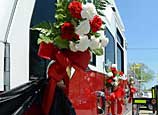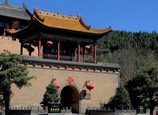
Businessmen need special protection from the martial gods of wealth since they face more risks in making money.
Apart from competing to burn the first incense for Zhao on Lunar New Year's morning and related festivals, many believers keep a statue of Zhao at home and pay homage by burning incense and leaving offerings of wine.
It is said that the martial gods of wealth should be positioned facing the door to drive away evils and protect the house owner. They should not be worshipped together with a civil god of wealth, nor should their statues be set next to those of other martial gods.
Offerings like foods or wine should put in containers made of earth of clay, since martial gods live in the mortal world.
According to legend, Zhao was one of the nine suns that were burning the earth and were shot down by the hero Hou Yi. While the other eight suns became monsters and immediately threatened mortals, Zhou became human but cultivated himself into an immortal in Sichuan Province.
In other myths, Zhao was a malevolent god in the underworld who killed people by spreading plague.
In the Ming Dynasty (1368-1644), Zhou became a popular God of Wealth, probably because commerce became increasingly important. With the improving social status of businessmen and traders, they found they needed a particular god to hear their prayers. Before the Ming Dynasty, businessmen, even wealthy ones, had extremely low social status, even lower than that of farmers.


















 Local villagers climb mountains to get relief supplies
Local villagers climb mountains to get relief supplies


![]()
